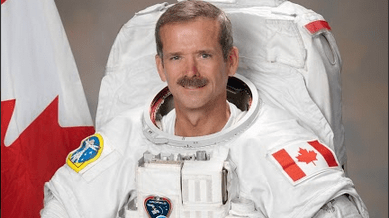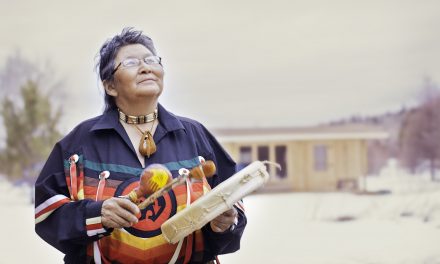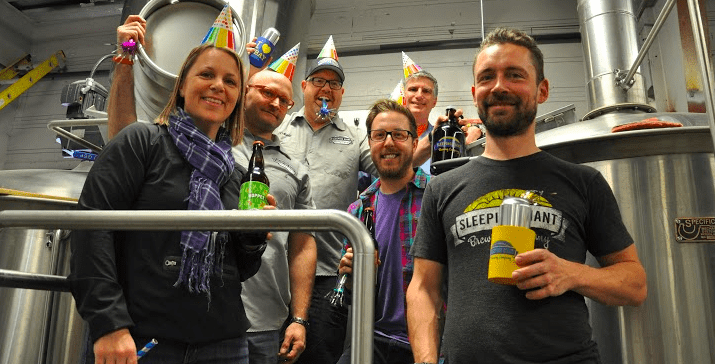By Donna Faye
For more than 50 years, we have known that astronauts were cool, but when Chris Hadfield used the International Space Station as a base to tweet, write, and record a song with the Barenaked Ladies, and perform “Space Oddity,” and then appeared in classic Bowie-style make-up on the cover of Maclean’s, he officially elevated the status of astronaut to rock-star cool.
Q. Congratulations on the success of your book, An Astronaut’s Guide to Life on Earth, a fresh take on The Hitchhiker’s Guide to the Galaxy! What has your experience in space taught you about living life to the full here on Earth?
A. Being an astronaut is gratification deferred beyond belief. It was my dream at the age of nine and it took 26 years. That taught me not to wait to celebrate successes until you reach the big event or else you’re setting yourself up for disappointment. I’ve learned to recognize the fact that the daily events is where your life actually occurs. Celebrate all of the little successes.
Q. Something you talk about in your book is “thinking like an astronaut.” In brief, what does that mean?
A. To think analytically, not accepting things at face value, but asking yourself: What are your actual fears? What are your actual reactions to those fears? What are your actual goals? It’s about asking yourself what you are concretely doing to achieve them. It’s about not being a passenger in your life, but a conductor.
Q. During your command on the ISS, you sought to educate your followers about living in space in ways that no astronaut had done before. Was that a mission or personal objective and were you aware of the impact you were having on your followers across the globe?
A. It has been both a personal objective and personal mission of my entire career, but I had never before had such a lofty platform or a lengthy period of time to do it. I have had countless opportunities to educate, including my involvement in the Pan-Canadian Education Protocol.
On the ISS I was very aware of people’s curiosity and people’s questions. I was transmitting rather than receiving. To have five months in the ISS to think about it, write, and write music. It was a great time to be productive and hopefully people would be interested. I could make videos about how to go to the toilet in space or brush your teeth, cut your hair or sleep. I was sure people would be able to use them.
Q. You spent most of your adult life in the United States for your career, but always promised your wife you’d return to Canada. Why are you proud to be Canadian?
A. I’ve lived outside Canada for 26 years. One of the beauties about living outside Canada is that you get perspective on what it is to be Canadian. We do civilization differently here. We have expectations of mutual support and good government. We treat each other well. I see examples of that every day and it makes me proud. Having lived outside Canada for 26 years, I am doubly proud.
Q. Did seeing Canada from space inspire an even greater sense of patriotism?
A. I don’t know if I could be more patriotic. I am not blindly patriotic. Every country has some things they do well. Canada is not perfect but we have an excellent expectation of how to be a citizen and be a good country.
Q. Stephen Harper has said you have made all Canadians prouder and you have been referred to by some as a Canadian hero. Who is your hero?
A. When I was young it was easy to choose heroes—2D figures in popular media like Spider Man and Elastic Man. As I got older, then I chose media heroes. But then you realize that no one is constantly heroic. For me, heroes are the brave, the clever, the confident. The originals. Every single person does heroic things. In Prince George I met a young woman, a cancer survivor who went to the Olympics, who is a graphic artist, teaches, and is a student in medical school. The combination of decisions she has made and the things she has faced make her a hero. She’s not trying to be one and she certainly doesn’t fit the square-jawed, comic book stereotype of a hero. I think there is inherent heroism in everyone.
Q. Since announcing your retirement in June 2013, you’ve lent your support to a number of causes including tourism in Ireland and observing Earth Hour. What cause or causes really matter to you?
A. The most important causes are about making decisions for the greater good, based on reality, fact, good science, and competence. You need symbols and inspiration—for example, my work promoting tourism in Ireland or Earth Hour—it helps allow people to take an interest in things. But the real cause is what is best for us as a species, as a nation, as individuals. The big issues are energy production, climate change, the health of people around the world. Those are important. I’ve lent my name to some good things going on, including what I did in space, to get people thinking about issues on a personal level: “Maybe I should start thinking about how I can change things in my own life.”
Q. What does the future hold for space exploration?
A. You can take the word “space” out of it. If you’re looking to the future, you just have to look at the past. It’s human nature to explore. That’s why babies take their first steps. That’s why humans aren’t still living in the Olduvai Gorge. Every successive generation has a drive to explore. Humans have always used technology to see what’s “over there.” Then you see the advantages and you want to be there. With improved technology we’ve been able to live places we never could have lived before. There are 100 people living at the South Pole right now. It gets to -120 degrees there. Space exploration is part of a continued pattern of expansion. The only limits are technological.
There’s nothing mystical about space exploration. It’s just another facet. The future of space exploration is like all other exploration in the past. It’s inevitable. It’s natural and it’s unhurried. It teaches and enriches us and it will continue.
Q. What is one thing people would be surprised to learn about Chris Hadfield?
A. I was a downhill ski instructor and I raced downhill for many years. And I’d like to learn to play the bagpipes.
Leadership Thunder Bay will present An Evening With Chris Hadfield at the TBCA on June 4 at 7:30 pm. Tickets are $55 and available at the box office.















